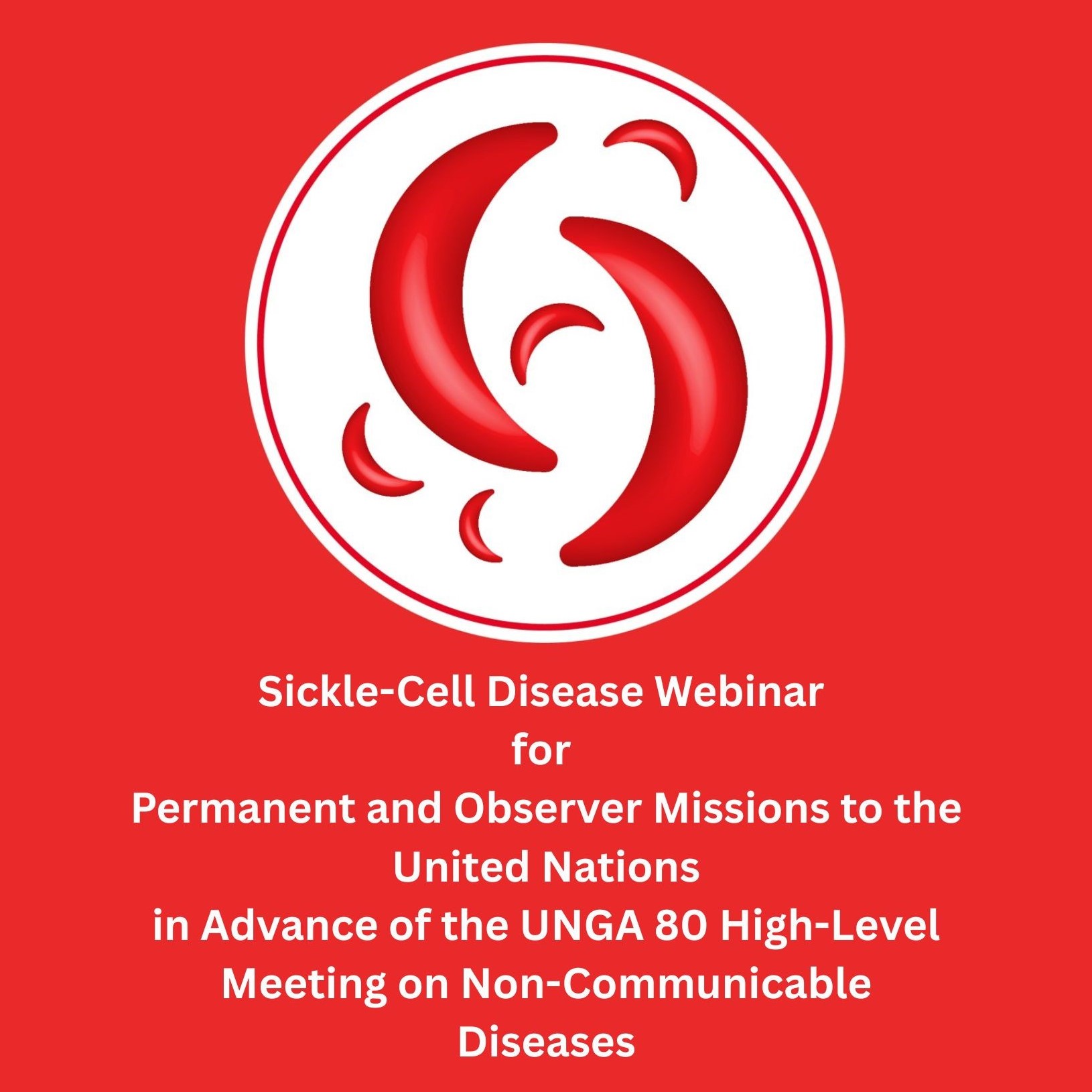
Sickle-Cell Disease Webinar for Permanent and Observer Missions to the United Nations in Advance of the UNGA 80 High-Level Meeting on Non-Communicable Diseases
Date: Wednesday, July 31 2025
Time: 11:00 AM (NY Time)
Location: Zoom
BACKGROUND
Sickle Cell Disease (SCD) is a group of inherited red blood cell disorders that affect hemoglobin, the protein that carries oxygen through the body. Normally, red blood cells are disc-shaped and flexible enough to move easily through the blood vessels. In sickle cell disease, red blood cells become crescent- or “sickle”-shaped due to a genetic mutation. These sickled red blood cells do not bend or move easily and can block blood flow to the rest of the body. The blocked blood flow through the body can lead to serious problems, including stroke, eye problems, infections, and episodes of pain called pain crises, which are often beyond pharmaceutical intervention.
SCD is particularly common among people whose ancestors come from sub-Saharan Africa, India, Saudi Arabia and Mediterranean countries and is the most common blood disorder inherited globally. Migration raised the frequency of the gene in the American continent. In some areas of sub-Saharan Africa, up to 2% of all children are born with the condition. In broad terms the prevalence of the sickle-cell trait (healthy carriers who have inherited the mutant gene from only one parent) ranges between 10% and 40% across equatorial Africa and decreases to between 1% and 2% on the North African coast and
Since there are inconsistent newborn screening programs and surveillance across the region, there is a paucity of accurate and reliable data on the disease. Data collection for sickle cell disease is not included in most national population-wide surveys. These data gaps have negatively impacted the prioritization and allocation of resources for the disease. But the data that is available is not encouraging. For example, more than half the children diagnosed with SCD in Sub-Saharan Africa die before their fifth birthday.
Beyond its public health impact, sickle cell disease also poses numerous economic and social costs for those affected and their families and can interfere with many aspects of patients’ lives, including education, employment, mental and social well-being and development.
There are effective treatments that help patients manage and live with the disease, and the development of new curative therapies holds tremendous potential to transform lives and improve health. Encouragingly, gene-based curative therapies offer real promise to SCD patients even in resource constrained settings, if made widely accessible. Heightened understanding of the disease and galvanized political will are needed to defeat SCD.
PURPOSE/OBJECTIVE
- Raise awareness and inform Permanent and Observer Missions about Sickle Cell Disease (SCD);
- Build political will to address SCD globally, but especially in resource constrained countries; and
- Improve understanding of the treatments available today (e.g., hydroxyurea) and the treatments needed for tomorrow, including gene therapies accessible to even the poorest of the poor.
AUDIENCE
Permanent and Observer Missions to the United Nations (UN) in New York, UN Secretariat, Secretary-General’s Scientific Advisory Board and UN Funds, Programs and Specialized Agencies, and others interested in SCD.
MODERATOR
Dr Tshidi Moeti, MD, is a Botswana physician, public health specialist and medical administrator who served as Regional Director of the World Health Organization (WHO) Regional Office for Africa (AFRO), headquartered in Brazzaville, the Republic of the Congo, from February 2015 to February 2025. See https://www.afro.who.int/node/20675#:~:text=Matshidiso%20Rebecca%20Moeti-,Dr%20Matshidiso%20Rebecca%20Moeti,effective%20and%20driven%20by%20results.
PANELISTS
Adekunle Gold is a Nigerian Afrobeats singer and songwriter He gained widespread attention after releasing the 2015 hit single “Sade.” In 2022, Adekunle revealed his lifelong struggle with SCD Disease. He has dedicated himself to advocating for SCD awareness through the Adekunle Gold Foundation. See https://www.adekunlegold.com and https://adekunlegoldfoundation.com
Jeremy Farrar, MD is the World Health Organization (WHO) Assistant Director-General Health Promotion and Disease Prevention and Control. He previously served as WHO Chief Scientist. See https://www.who.int/director-general/who-headquarters-leadership-team
Isaac Odame, MD is a Professor, Department of Pediatrics, University of Toronto; Medical Director, Global Sickle Cell Network, Centre for Global Child Health, The Hospital for Sick Children, Toronto. See www.sickkids.ca/en/staff/o/isaac-odame/
Emmanuel Peprah, PhD is an Associate Professor, NYU School of Global Public Health and Contact-Principal Investigator, NIH-funded study related to managing sickle cell disease through increased use of hydroxyurea in Nigeria. See www.acceleratescd.com.
FORMAT
Ninety-minute facilitated discussion beginning with introductory remarks and a brief statement from each of the panelists. Following the discussion, there will be moderated questions from the virtual audience with answers from the participants.